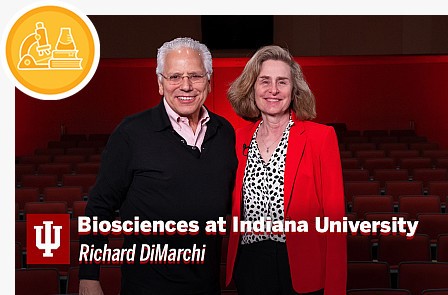
Description of the video:
0:00This state.
0:02
This city. Was first in biomedicine.
0:06
The technology that we know is biotechnology
0:09
was advanced to be medicines that benefited society, right here.
0:14
This is the right place.
0:16
at Indiana University.
0:18
Our dedication to groundbreaking research in bioscience is is transforming
0:22
lives, driving innovation and shaping the future of medicine.
0:27
Today, I am honored to welcome a faculty member who embodies that commitment.
0:32
Richard DiMarchi is a Distinguished Professor of Chemistry
0:35
and the Gill Chair of Biomolecular Sciences.
0:38
His career spans decades of transformative
0:41
work in academia and the pharmaceutical industry.
0:44
Most recently, he received the prestigious breakthrough of the year
0:48
award from the American Association for the Advancement of Science
0:52
for research that laid the foundation for drugs
0:55
that are revolutionary in the treatment of obesity worldwide.
0:59
Welcome, Richard, and thank you for joining me today.
1:01
So for many of us, you know, as these new, drugs have come out, that that
1:06
you really laid the groundwork for that we that we see from so many companies,
1:10
it feels like overnight, overnight diabetes has been addressed
1:13
overnight obesity is is a problem soon to be in the rearview mirror.
1:18
Take a second to
1:19
talk about how it wasn't really overnight or at least for you and your team.
1:23
You know, there are days when it feels as if it's overnight and then there's days
1:28
when you realize those those 50 years feel like it was more than 50 years.
1:32
And for much of that time, these these new medicines,
1:36
these large molecule medicines, which are largely injectable products,
1:41
were back water to the traditional pharmaceutical industry.
1:46
Largely because they were injectable products
1:49
where the whole value system was built
1:52
around oral medic medications.
1:55
Coupled to that was also the challenge that obesity wasn't viewed as a disease.
2:00
There wasn't a belief that this was something that we should be doing with,
2:05
with, with medicines, despite the known risk it represented for long term health.
2:11
We did what universities are meant to do break new ground.
2:16
And and at a university, you just have the autonomy
2:19
and the independence to do what many people tell you is not, not possible.
2:24
I you recently received, $138 million grant, from the Lilly Endowment
2:28
to establish the IU Launch Accelerator for Bio Sciences,
2:32
which, of course, we're calling the IU LAB This project is amazing, right?
2:35
It's a really bold step to advance health science research and education.
2:40
And so my question to you is what excites you most about this initiative
2:44
and the future of bioscience research that will be able
2:47
to lead the large collaboration for the state of Indiana?
2:51
The state of North Carolina, prides itself for being first in flight.
2:55
See it on their license plate. Right.
2:56
You see, virtually every This state.
2:59
This city. Was first in biomedicine.
3:02
The technology that we know is biotechnology
3:06
was advanced to be medicines that benefited society, right here.
3:11
This is the right place.
3:12
Indiana should pride itself is being first in biomedicine.
3:16
And the university coupled with, with Lilly and everyone else
3:19
who who is associated with these, these life sciences, should
3:23
should come come together to an even greater
3:26
extent than we have right now to take this to an even higher level.
3:30
I agree, it's going to be a wonderful partnership.
3:33
And, you, my friend, will always have a desk at IU LAB or,
3:36
I guess I should say, a bench. Thank you very much.

